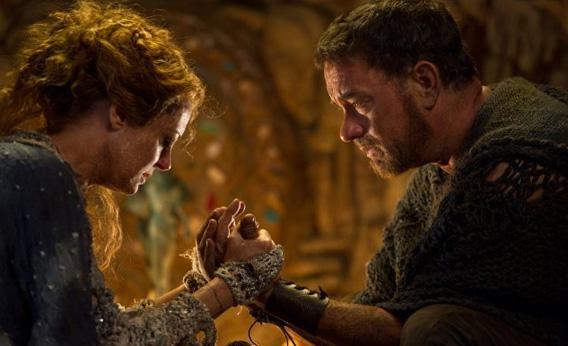Following the announcement of the 2013 Academy Award nominations yesterday morning, Oscars pundits rushed to round up the year’s biggest snubs. Zero Dark Thirty director Kathryn Bigelow wasn’t nominated for Best Director. Neither were predicted nominees Ben Affleck and Tom Hooper. Matthew McConaughey wasn’t honored for giving the performance of his career in Magic Mike. But no one is talking about what I think is this year’s biggest omission: Cloud Atlas got screwed.
What makes this especially frustrating is that no one, not even the people who financed the film or those who put it in theaters, appears to be fighting for this movie, which is easily one of the most ambitious and arguably one of the most cinematic films of the year. At this point it seems to exist purely in some fever dream; it was unceremoniously shuffled in and out of cineplexes by an apparently embarrassed distributor dealing with one of the year’s biggest box office flops. It was largely derided by critics who, save for some notable exceptions, seemed unwilling to engage with this mesmerizing film, at best finding it a goofily endearing “big weird mess,” as Slate’s own Dan Kois argued in our Spoiler Special.
Though it is impractical-bordering-on-impossible to summarize the plot, the film weaves together six stories across 500 years, elliptically connecting them through themes of bondage, freedom, passion, and jealousy. It features a diverse collection of characters played across race and gender by Tom Hanks, Halle Berry, Jim Broadbent, Hugo Weaving, and others, often so heavily transformed by makeup it’s hard to tell who’s who. It asks how our actions resonate across time, and many segments transition through clever thematic juxtapositions that seek to comment on the cyclical nature of human suffering and joy. If it sounds heady, it is—and also thrilling, romantic, frustrating, funny, enigmatic, and, most of all, sincere.
That sincerity is, as I argued with regard to the Wachowskis’ previous work, one of the things that turns people off most about this movie. The three directors adapted David Mitchell’s incredibly elaborate novel with an earnest dedication to its questions. That those questsions are not then answered might be easy to interpret as artistic failure.
It’s true that the Oscars often ignore the most artistically challenging films. The Master was only nominated in the acting categories; Holy Motors was shut out altogether. There’s an irony in seeing the Academy celebrate the dreamlike power of the movies at every one of their ceremonies and then pass over the films that actually draw on that power most brilliantly. But it’s particularly disappointing when they ignore directors, like the Wachowskis, who do so in the language of Hollywood, with Oscar-friendly stars and terrific action sequences along with heartfelt emotional storylines. What I suspect is unforgivably missing, as far as the Academy is concerned, is the thematic hand-holding that will make sure every audience member knows “what it all means.”
If there’s one thing the Academy hates, it’s mystery. Films that underline every emotional payoff and moral truth get recognition, but movies that indulge at all in the weird and the sublime get snubbed, even when they have Oscar pedigrees, even when they try to do everything the Academy otherwise celebrates. It makes Oscar Nominations Day a frustrating affair every year. But clearly I’m just one little Old Un, yibberin’ and yarnin’, sivvyin’ for the true true.
